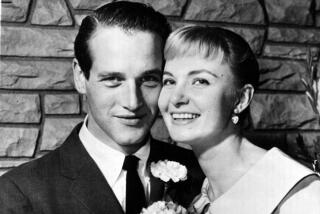A novelist’s roots are in Hollywood
SOME places you can’t find on a map. You can’t reach them by plane or train -- not even by foot. Novelist Bret Lott got here, to this very spot in Echo Park, via a more oblique route: a collection of photographs, a tilting “postmodern” bluegrass melody and the nuts-and-bolts of family memory.
He remembers these old houses, stucco, red tile; the spot, “over there,” where the Alvarado School was. But it’s quite a different experience, some 40 years later, to stand in the sharp summer sun at Echo Park Lake. This is a neighborhood that Lott, an L.A. native who now lives in South Carolina, hasn’t seen up close since he was 8; a neighborhood in which much of his new novel, “Ancient Highway” (Random House: 244 pp., $25), takes place. In “Ancient Highway,” he goes back in time, to the 1920s, 1940s and 1980s, writing about the fringes of Hollywood -- both the place and the idea of it -- where his protagonist, a Texas dreamer named Earl Holmes, arrived, at 14, to be in “flickers.”
Lott’s own grandfather, also Earl Holmes, came here to be in movies in the 1920s. He jumped a train and hobo-ed out from East Texas. “He died carrying a Screen Actors Guild membership card, but he never made it,” Lott says as he strolls through the sprinkler-drenched grass. “He was in lots of movies, but he was never anybody you’d have recognized or would have even seen.”
This neighborhood is where his grandfather’s first chapter unfolded, where he ended up with his young wife and daughter in an apartment on Sunset at Alvarado. Just as he lived on the fringes of his dream, he also worked there, as a janitor sweeping up on set, telling stories as wide as a movie screen. How much, if any of it, was true?
Things have changed so little, really. People still land in Los Angeles to grab the hem of something, a dream, a lead, a larger idea. As Lott makes his way through the park, he sees men in grimy T-shirts collapsed beneath the spread of a palm tree and then a crisp-collared student type with a movie camera, his lens trained on a setup near the foot bridge. A cluster of men in work boots and baseball caps sits near the bust of Cuban poet-activist José Martí; when Lott approaches, one grabs an open bottle of red wine and stashes it in a backpack.
Runaways, every one of them. They came from here or there, and are on their way to what’s next. All the while, their own scripts scroll in their heads.
Earl’s story embodies all this -- the hope for something bigger, the yearning to be seen. That’s the drama at the heart of his reinvention. Was he really in a Foremost milk commercial? Did he have a cameo in a Three Stooges film? Had he really played cards with Howard Hughes? Or was this just a way to nudge himself closer to his dream?
“Being seen” is Earl’s mantra. Pausing on the sidewalk after a matinee at Grauman’s Chinese, posing while disembarking from the Yellow Car, these are his “street corner screen tests.” As he tells his loyal but beleaguered wife, Saralee, “You never know who you’ll see or who’ll see you.” But his dream, and his determination to attain it, eclipses all else: his wife’s happiness, his daughter’s sense of contentment. It’s a form of self-obsession, and it transforms the family, passing from Earl to that daughter, Joan, and ultimately to a restless grandson who needs to up and run as well.
This story -- the book’s and Lott’s own -- is strewn across Southern California. Reseda, North Hollywood, Pacoima: These are places lost to the world’s imagination of what Los Angeles is.
Lott presses up the incline of Park Avenue and onto Sunset Boulevard. Small beauty shops and street vendors mix with a new wave of bohemian cafes and high-end boutiques. It’s hardly the Sunset Boulevard of Billy Wilder, but even so Lott knows the power of the name. “In the book,” he says, “they live on Alvarado, but the actual apartment is on Sunset. I just thought, ‘Here I am writing this novel about this whole Hollywood thing, and where do they end up living? On Sunset Boulevard. A little bit too much to swallow.”
But this is L.A.’s reality: Hollywood has long existed in the mind, and residents must live around that idea. This afternoon, the sky is busy with helicopters, and fire engine sirens scream so loud it’s difficult to hear. For Lott, though, it’s not so hard to see beneath it, back into the past -- as if he had his old photographs, and a Bill Frisell CD, “The Willies,” “with a clinkity-clink banjo, this haunting, electronic layering.” “It would have been right here,” he says, standing before a large lot choked with dry yellow weeds and sunburnt trash. “He stands on the corner, right there, after he gets off the streetcar” -- he points across Sunset to an H&R; Block storefront -- “and he does his little street-corner thing.” He turns back, facing Alvarado. “And from here, Joan could look out the window and see him get off the streetcar.”
Lott’s grandfather, the author says, was a narcissist. “But he was an interesting kind of narcissist because he was great to be around. He was funny. And all these great stories. A practical joker. But all these things were basically designed to say, ‘Look at how funny I am at your expense.’ ” When Lott started looking into his grandfather’s stories about Hughes, he thought, “ ‘This is nuts. This is crazy.’ And the weird thing was that there were just enough things true that made you think: Maybe it’s all true or none of it is true.”
At a certain point, of course, one must ask: Why fiction and not memoir? Lott comes to a full stop to consider this. “I love writing stories,” he explains. “To write a novel allows you . . . to use particular moments and thoughts and elements out of the lives of people you love. It allows a framework in which I can use my imagination.”
With 15 books under his belt, Lott thinks it’s curious that only two are set in Los Angeles, and even then “the characters aren’t really there in their heads.” (“Jewel,” the 1999 novel -- also drawn from a family story -- that became an Oprah Book Club choice, has roots in L.A.’s soil, as well.)
This one built slowly. “One of the first short stories I wrote that was any good,” Lott recalls, “I was 19 years old, and it was about a brother who comes back from the Navy.” This is a plot element in “Ancient Highway” and a key part of the grandson’s narrative. “So actually, I’ve been writing this story since I was 19. This is 30 years of trying to figure out how to tell it.”
There are, Lott continues, “moments and stories that have been told my whole life that you fill in with your imagination.” In a way, then, he’s not so different from Earl. For both of them, story becomes a way not just to embroider but to begin to understand one’s place in the fabric, a legacy turned legend, if you will.
“Family is like a highway,” Lott says. “You run away, you try to get out of it, but you’re never getting off. It’s been there since before you ever showed up, and it’s going to keep going after you die. People try to get away all the time. But the fact that you’re trying to get away is validation that you’re all on the same highway.”--
More to Read
Sign up for our Book Club newsletter
Get the latest news, events and more from the Los Angeles Times Book Club, and help us get L.A. reading and talking.
You may occasionally receive promotional content from the Los Angeles Times.








